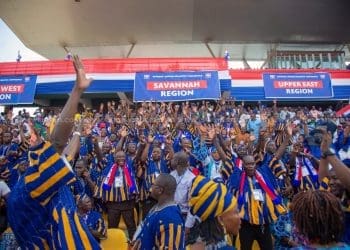The Chief of Naval Staff, Rear Admiral Livinus Bessing, has appealed to the Ghanaian media to use its influence and platforms to advocate for adequate resourcing of the Ghana Navy, stressing that the country’s maritime security and economic future depend on it.
Speaking at the opening ceremony of a three-day training workshop for journalists and media practitioners on maritime security, safety, and the blue economy in the Gulf of Guinea, Rear Admiral Bessing said the ability of the Navy to effectively safeguard Ghana’s territorial waters was being severely constrained by logistical limitations.
The workshop, organised by the European Union-Enhanced Maritime Action in the Gulf of Guinea (ENMAR) and the Gulf of Guinea Maritime Institute (GoGMI), is funded by the European Union and implemented by Expertise France.
It aims to build the capacity of journalists to better understand maritime security issues and report on the blue economy in ways that promote national and regional security.
Rear Admiral Bessing said it was not a question of competence or commitment, but rather of resources.
“It’s not because we do not know how to do our work,” he said, “but we simply don’t have the needed tools to do our work.”
He cited a recent example in which a French navy vessel docked at the Tema Port and successfully intercepted more than 10 tonnes of narcotic drugs in Ghanaian waters.
“It’s because most of our navies, especially those in the Gulf of Guinea, are not well resourced,” he lamented.
The naval chief explained that much of what happens at sea goes unnoticed because the maritime environment is “far from the shoreline and hidden from public view,” making it difficult for citizens—and even policymakers—to appreciate the threats facing the country’s maritime space.
He therefore called on the media to bring these invisible challenges to light through sustained coverage and advocacy.
“Security issues on land are easily covered because they can be seen,” he said. “But what happens at sea normally goes unnoticed. That is why we need the media to play an advocacy role so governments can appreciate the need to provide resources for the navy.”
Rear Admiral Bessing revealed that Ghana loses about US$200 million annually to Illegal, Unregulated and Unreported (IUU) fishing and other maritime crimes, including piracy and drug trafficking.
These, he said, could be significantly reduced if the Navy were adequately equipped with modern patrol vessels and surveillance tools.
He expressed frustration over the government’s prolonged delay in acquiring two Offshore Patrol Vessels (OPVs) for the Navy—a flagship project that has been on the drawing board since 2010.
“This project has gone through several governments, but we have yet to get it,” he said.
“The platforms cost less than US$200 million. You can imagine that from 2010 till now, US$200 million multiplied by 15 years could have bought us several of the platforms. This is the sort of advocacy I want to challenge the media to take up.”
Rear Admiral Bessing encouraged journalists to collaborate closely with the Navy, to seek information about threats such as piracy, drug trafficking, and illegal fishing, and to use their platforms to draw public and political attention to the Navy’s operational needs.
The Chief of Naval Staff’s appeal was echoed by the President of the Ghana Journalists Association (GJA), Mr. Albert K. Dwumfour, who delivered the keynote address at the event.
He commended Ghana’s consistent commitment to safeguarding its maritime domain and supporting regional cooperation in the Gulf of Guinea, but agreed that much more needed to be done to amplify maritime issues in the national conversation.
Mr. Dwumfour noted that maritime challenges are often seen as overly technical and thus excluded from mainstream public discourse.
“Too often, maritime issues are treated as matters for specialists and remain hidden from the public eye,” he said. “However, when journalists make these issues visible and explain the human cost of illegal fishing, the risks of piracy, or the promise of a thriving blue economy, they can do more than inform—they can drive accountability and better governance.”
He urged journalists to view the maritime sector as a national development story and a human security issue, not just a niche beat.
“By the end of this workshop, I hope you will be convinced that the maritime story is a Ghanaian story, a West African story, and ultimately a story about sustainable development,” he said.
Mr. Dwumfour also highlighted the importance of diverse voices in maritime reporting, saying that inclusivity in storytelling makes journalism stronger, public debate richer, and democracy healthier.
“The ocean’s future must not be narrated by a few,” he concluded.
The three-day training is expected to equip participating journalists with the knowledge and tools needed to effectively report on maritime security, expose illegal activities at sea, and contribute to national advocacy for a better-equipped Ghana Navy capable of defending the country’s blue economy.












